EC approves EUR 400 million measure to support Bulgargaz in the context of Russia's war against Ukraine

The European Commission has approved a measure granted by Bulgaria, worth around 400 million euros (800 million leva) in support of Bulgaria's public natural gas supplier, Bulgargaz EAD, in the context of Russia's war against Ukraine.
The scheme was approved under the Temporary Framework for State Aid in Crisis, adopted by the EC on 23 March 2022 and amended on 20 July 2022, based on Article 107(3)(b) of the Treaty on the Functioning of the European Union (TFEU), which recognizes that the EU economy is experiencing serious difficulties. This Temporary Crisis Framework was amended again on 28 October 2022 and replaced by the Temporary Framework for State Aid in Crisis and Transition, adopted by the Commission on 9 March 2023, to support measures in sectors that are key to acceleration of the ecological transition and reduction of dependence on fuels, according to a statement from the European Commission.
The Bulgarian measure
Bulgaria notified the EC under the temporary crisis framework of a measure of around 400 million euros (800 million leva) to support Bulgargaz EAD in the context of Russia's war against Ukraine.
Bulgargaz EAD is an exclusive public supplier of natural gas in Bulgaria, indirectly wholly owned by the Bulgarian state. Due to Russia's suspension of Bulgargaz EAD's long-term contract with Gazprom Export OOO, which covers 90% of the natural gas volumes supplied by Bulgargaz EAD to customers, this beneficiary is facing unusual liquidity needs, for to secure its natural gas supplies in the context of rising gas prices on European energy markets.
The aid under this measure is in the form of a loan with subsidized interest rates provided by the Bulgarian Ministry of Energy.
The Commission found that the Bulgarian measure meets the conditions specified in the temporary crisis framework. In particular, the subsidized loan i) was granted before 31 December 2022; ii) covers urgent liquidity needs for working capital purposes; iii) has a term of 3 years; and iv) has interest rates that are consistent with the minimum levels set in the crisis timeframe.
The Commission concluded that the Bulgarian measure is necessary, appropriate and proportionate to overcome serious difficulties in the economy of a Member State in accordance with Article 107, paragraph 3, letter b) of the TFEU and with the conditions specified in the temporary crisis framework.
On this basis, the Commission approved the aid measure under EU state aid rules.
Context
The Temporary Framework for State Aid in Crisis, adopted on 23 March 2022, allows Member States to use the flexibility provided for in State aid rules to support the economy in the context of Russia's war against Ukraine.
The crisis timeframe was amended on 20 July 2022 to complement the winter gas saving package and in line with the objectives of the REPowerEU plan. The crisis timeframe was further amended on 28 October 2022 in line with the Regulation on emergency intervention to tackle high energy prices and the Regulation on strengthening solidarity through better coordination of gas purchases, reliable price benchmarks and a reliable transboundary gas exchange.
On 9 March 2023, the Commission adopted a new temporary framework for state aid in crisis and transition to promote support measures in sectors that are key to the transition to a climate-neutral economy, in line with the Green Industrial Plan pact Together with the amendment to the General Block Exemption Regulation (GBER), which the Commission approved on the same day, the Crisis and Transition Temporary Framework will help accelerate investment and financing for clean technology production in Europe. It will also support Member States in the implementation of specific projects within the national recovery and resilience plans that fall within their scope.
The new framework amends and partially extends the temporary crisis framework adopted on 23 March 2022 to enable Member States to use the flexibility provided for in State aid rules to support the economy in the context of Russia's war against Ukraine.
The Crisis and Transition Temporary Framework complements the many opportunities available to Member States to develop measures in line with current EU State aid rules. For example, EU state aid rules give Member States the opportunity to help businesses deal with liquidity shortages and those needing urgent help to survive. In addition, Article 107(2)(b) of the Treaty on the Functioning of the European Union enables Member States to compensate companies for damage caused directly by an extraordinary event, such as that caused by the current crisis.
The non-confidential version of the decision will be submitted under No. SA.107425 in the State Aid Register on the Commission's competition website once any confidentiality issues have been resolved. New publications of state aid decisions on the Internet and in the Official Journal are indicated in the Competition Weekly e-News.
